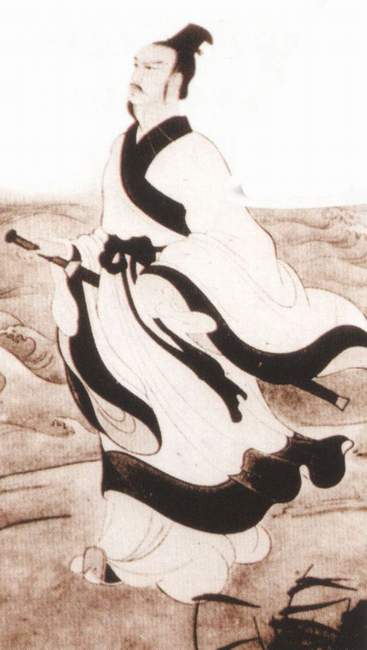(单词翻译:单击)
Qu Yuan(340 B.C.~270 B. C.), whose real name was Ping (Yuan was his courtesy name. He once called himself Zhengze with a courtesy name as Lingjun), is remembered as a patriotic poet in ancient China.
屈原(公元前340年~公元前270年),名平,字原,又自云名正则,字灵均。
He was born to an aristocratic family which belonged to the same clan of the King of the State of Chu.
出身于楚国贵族,与楚王同姓。
As a court minister, Qu Yuan attempted to persuade the king to promote the talented and to govern with laws and regulations in purpose of achieving "perfect ruling". He also wished that the State of Chu could, through political reforms, become a sovereign and affluent power, capable of reunifying the war-torn China.
他辅佐楚怀王,曾任左徒和三闾大夫,具有进步的政治理想。主张举贤授能,修明法度,实行“美政”,希望通过楚国内部的政治改革,使国家独立富强,进而统一中国。

However, the kings of Chu fell for the influence of some corrupt and jealous court officials who slandered Qu Yuan and banished him as a result.
后来屈原为子兰、靳尚等人谗害,被怀王放逐到汉北,又被襄王流放于江南。
Upon hearing the news that the capital of Chu was captured by the State of Qin, Qu Yuan ended his life in frustration by leaping into the Miluo River.
楚国沦亡后,自沉汨罗江而死。
Qu Yuan's unswerving spirit of fortitude and patriotism shined through his entire life and was embodied in his literary works.
不屈不挠的斗争精神和始终不渝的爱国热情,是屈原思想与性格中最辉煌的地方,他的作品是他一生斗争的实录。
Li Sao, his key poetic work, is the first existing long lyric poem in the history of Chinese literature and a masterpiece of romanticism.
代表作《离骚》是我国诗歌史上现存第一篇宏伟壮丽的抒情长诗,也是一篇浪漫主义的杰作。
In this first-person narrative poem, he successfully created the image of a chaste and lofty gentleman by using himself as the prototype.
这是一篇自叙性长诗,以诗人自身为原型,成功地塑造了一个纯洁高大的抒情主人公形象。
Loaded with romantic ideas, Li Sao was compiled into an anthology of poetry called Chu Ci (or Odes of Chu), which marks the fountainhead of the romantic strain of Chinese literature. Li Sao was also made comparable with the major collection of Chinese poems, Shi Jing (The Book of Songs).
浓厚的浪漫主义色彩,是其中最引人注目的成就。以《离骚》为代表的楚辞成为我国诗歌浪漫主义传统的源头,与《诗经》被后人并称为“诗骚”。
Other works of Qu Yuan include Jiu Ge (Eleven Odes), a collection of surrealistic lyric poems adapted from ritual songs of the State of Chu. His Jiu Zhang (Nine Elegies) faithfully records his life in exile and expresses his intense political frustration and patriotic emotions. In Tian Wen (The Riddle), he bombards with 170 questions throughout the poem, presenting his extensive learning and inquisitive spirit.
此外,屈原的作品中,《九歌》,11篇,是在楚国民间祭神乐歌的基础上改写而成的一组体制独特的抒情诗,充满奇异而浓烈的神灵气息;《九章》,9篇,真实记叙了放逐期间的生活经历,表达了他在政治上的苦闷和强烈的爱国情感;《天问》则从头至尾一口气提出了170个问题,充分反映了诗人思想的博大和勇于探求真理、敢于大胆怀疑的精神。
As one of the earliest great poets in Chinese literature, Qu Yuan marked a turning point from poetry as collective chanting to independent composition.
屈原是中国文学史上第一个伟大的诗人,开创了中国诗歌从集体歌唱到个人独立创作的新纪元。


